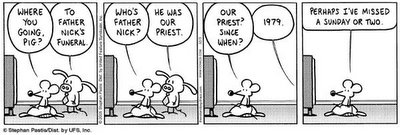I got home from snowboarding and was anxiously anticipating plopping down to watch
a new episode of "American Dad" yesterday when Fox decided to interrupt my relaxation to show
the President's speech on Iraq. This morning I had to leave my car for a meeting during his radio news conference, but I'd heard enough excerpts throughout the day to get a sense for it long before turning to
the official transcript. I have responses in two parts, first to the Iraq language and second to the wiretapping admission:
First of all, I felt as though the President was speaking to me on Sunday when he said :
I also want to speak to those of you who did not support my decision to send troops to Iraq: I have heard your disagreement, and I know how deeply it is felt ... I don't expect you to support everything I do, but tonight I have a request: Do not give in to despair, and do not give up on this fight for freedom.
All I can say about that is that people who disagreed with the decision to go to war cannot possibly "give up on this fight for freedom", you have to first support something in order to be able to "give up" on it. For those of you who know what was said in place of the ellipsis, I will revisit that passage later in this post.
Second, as election results are starting to trickle in, I have to conclude that the "I'm-not-Shia-or-Sunni-I'm-Iraqi" voter from Sunday's speech is in the very slight minority, as
everybody else seems to have voted along strict sectarian lines. The tremendous lack of support for the secular slate also does little to reassure me that this government will not contribute to a "movement that exploits Islam in the service of radical political aims -- a vision in which books are burned, and women are oppressed, and all dissent is crushed." I'm not saying that a vote for religious candidates will automatically lead to
Sharia, but in the Middle East as in the rest of the world, I think everybody benefits from keeping church and state in their respective corners. In any case, I think it's either hypocritical or naive for any of us to expect that a truly democratic Iraq would not be highly susceptible to the use of
religion as political campaign tool.
Finally, with regard to Sunday, I was a little put off by the President's belief that not only will a constitutional democracy in Iraq play out as hoped, but also that it will be the first of its kind in the region. How is the expected Iraqi system any different from those already in place in
Algeria,
Yemen,
Israel, and
Egypt? The election is being touted as part of a larger and recent attempt to overpromote the positive developments in Iraq. The selective use of intelligence that drove the nation to war spilled over into Sunday's speech as well, as the President proudly announced that "seven in 10 Iraqis say their lives are going well, and nearly two-thirds expect things to improve even more in the year ahead" while neglecting to mention that
those same polls indicate that
Fewer than half, 46 percent, say the country is better off now than it was before the war. And half of Iraqis now say it was wrong for U.S.-led forces to invade in spring 2003, up from 39 percent in 2004 ... Two-thirds now oppose the presence of U.S. and coalition forces in Iraq, 14 points higher than in February 2004. Nearly six in 10 disapprove of how the United States has operated in Iraq since the war, and most of them disapprove strongly. And nearly half of Iraqis would like to see U.S. forces leave soon.
As far as this morning's press conference, there is no need to rehash the parts of it that were merely regurgitated pieces of the Sunday speech. No, the big thing this morning was the
clandestine wiretaps of U.S. citizens authorized after September 11.
I would only like to quickly point out three things about these wiretaps, I could write more, but this is too long as it is. First, the President seems to subscribe to
Nixon's interpretation of what the Constitution does and does not allow the Executive to do. Second, I'm glad to see that on Sunday "the need for victory is larger than any president or political party, because the security of our people is in the balance", but on Monday it's ok to take
a partisan shot at Sens. Reid, Clinton, Schumer and Boxer for their position on the Patriot Act. Last, and perhaps most frightening, the President seems to believe that when Congress voted to authorize "
all necessary and appropriate force" following September 11, 2001, it afforded him the authority to pursue many of the extrajudicial tactics that, we are now learning, have been secretly adopted in the last 4 years. This is uncomfortably reminiscent of what some Argentine generals believed
in 1975.











1.jpg)